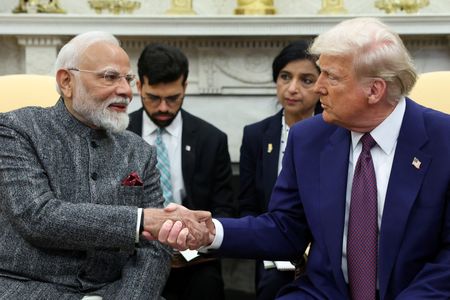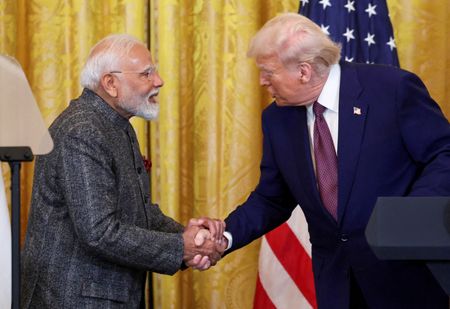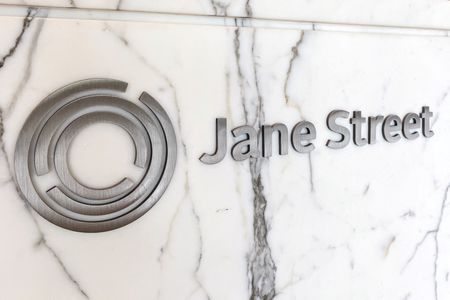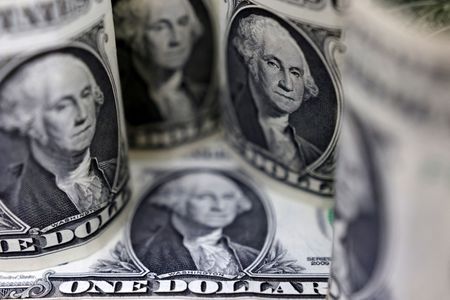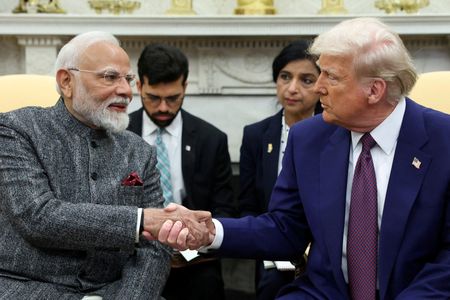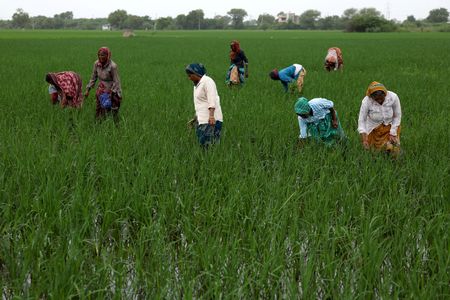By Manoj Kumar and Nikunj Ohri
NEW DELHI (Reuters) -India vowed on Thursday to protect its labour-intensive agriculture sector, a central sticking point in bogged-down trade talks with the U.S., as Washington threatened 25% tariffs, triggering outrage from the opposition and a slump in the rupee.
Without a deal, the rate will go into effect from Friday and single out India for harsher trade conditions than its major peers, potentially damaging the economy of a strategic U.S. partner in Asia seen as a counterbalance to Chinese influence.
Though negotiations are continuing, they have hit a wall due to the United States’ insistence that India open its agricultural markets.
New Delhi has long shielded the sector, which – with over 40% of the workforce engaged in farming activities – constitutes the most influential voting bloc in the world’s most populous nation.
“The government attaches the utmost importance to protecting and promoting the welfare of our farmers, entrepreneurs, and (medium and small businesses),” India’s trade minister Piyush Goyal said in a statement in the parliament.
U.S. Treasury Secretary Scott Bessent said in a CNBC interview on Thursday that the U.S. trade team was frustrated with India, adding that the future of trade deal between the two nations was now up to India.
U.S. President Donald Trump had said on Wednesday that, in addition to the 25% tariff on imports from India, the country would face an unspecified penalty for its dealings with Russia and its membership in the BRICS grouping of nations.
“I don’t care what India does with Russia,” Trump wrote in a Truth Social post on Thursday. “They can take their dead economies down together, for all I care.”
India’s benchmark equity indices, the Nifty 50 and BSE Sensex, fell as much as 0.9% in early trade before paring losses and both closing around 0.4% lower.
The rupee closed 0.2% down at 87.5950 to the dollar after touching its lowest level in more than five months earlier in the day.
COOLING RELATIONS
The government’s failure to clinch an agreement with Trump, even as other major world economies like the European Union, Japan and South Korea have struck deals in recent days, sparked anger among India’s political opposition.
“The government has destroyed our economic policy, has destroyed our defence policy, has destroyed our foreign policy,” opposition leader Rahul Gandhi told reporters on Thursday.
Economists warned the steep tariff could hurt India’s manufacturing ambitions and trim up to 40 basis points off economic growth in the financial year to March 2026. Some doubted whether further negotiations would lead to improved conditions.
“While further trade talks may bring the tariff rate down, it appears unlikely that India will secure a significantly better outcome than its eastern neighbours,” said Priyanka Kishore, an economist at Asia Decoded.
Other countries have negotiated better U.S. tariff rates, with Vietnam agreeing to 20%, Indonesia to 19% and Japan and the EU both facing levies of 15%.
On Wednesday, Trump said Washington had reached a trade deal with India’s arch-rival Pakistan that Islamabad said would lead to lower tariffs on its exports, though neither side has yet revealed the agreed rate.
Since India’s short but deadly conflict with Pakistan in May, New Delhi has been unhappy about Trump’s closeness with Islamabad and has protested, casting a shadow over trade talks.
Despite previous public displays of bonhomie between Trump and Prime Minister Narendra Modi, India has hardened its stance towards the United States in recent weeks.
Trump has repeatedly taken credit for the India-Pakistan ceasefire he announced on social media on May 10, but India disputes his claim that it resulted from his intervention and trade threats.
The U.S., the world’s largest economy, currently has a trade deficit of $45.7 billion with fifth-largest economy India.
(Additional reporting by Jaspreet Kalra in Mumbai; Writing by Sudipto Ganguly in Mumbai; Editing by Clarence Fernandez, Ros Russell and Joe Bavier)

